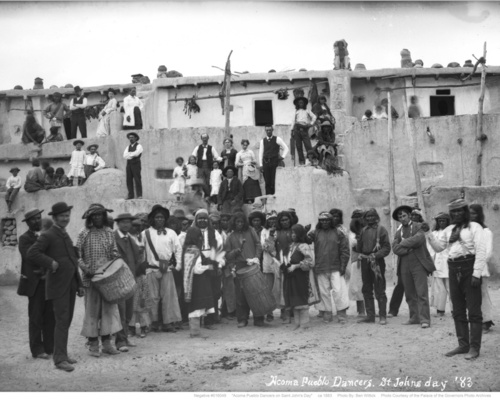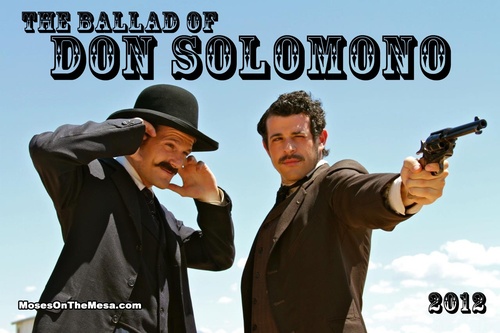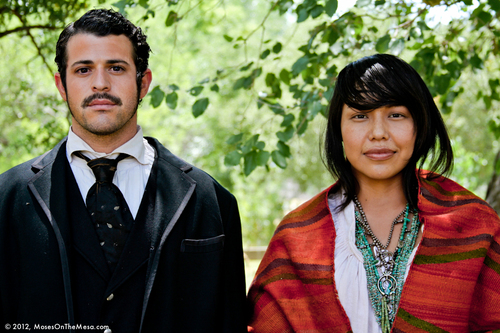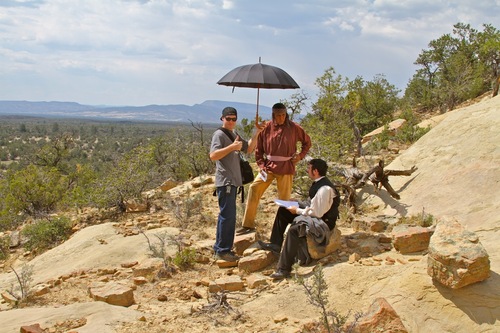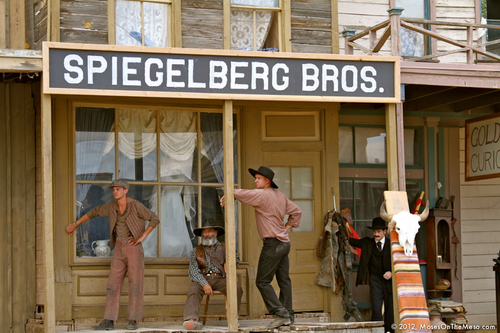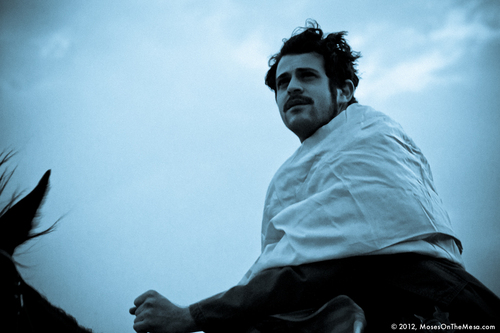
I wanted to share some dilemmas I faced in creating a character for my latest project. I am writing and directing a fiction film inspired by the real life of Solomon Bibo, who was a Jewish governor of a Native American tribe during the days of the Wild West. It's an incredible story that starts in 1869 when Solomon comes to America as a teenager to join his brothers in settling the West. The son of a cantor from a provincial Prussian town, Solomon survives the harrowing transatlantic and trans-America journeys and gets acclimated to life in the Southwest, which is full of outlaws as well as an ongoing war between the settlers and Native Americans (led by famous leaders like Geronimo).
With time, Solomon becomes a well-known and successful trader, and meets the Native American woman Juana Valle, granddaughter of the governor of Acoma Pueblo, which sits spectacularly on top of an impregnable mesa in a New Mexico valley. Acoma pueblo also happens to be the oldest continually inhabited settlement in North America. A few years pass, and Solomon and Juana's romance grows until they marry in 1885. The next year, Solomon is chosen as the governor of the tribe, a fact that repeats a few times, as the pueblo chooses a new governor every year. His years as governor are not without complexity as Solomon runs into opposition from the tribe's elders on account of some economic decisions and his support for Indian schools, where pueblo children are sent to get educated. The elders feel that the education is forced and that it causes the children to not come back to the tribe and its ways. Eventually, Solomon and Juana move to San Francisco, where they raise 7 children and where their love and business have to overcome the Great Earthquake of 1906 and the Great Depression. Throughout it all, they appear to be strongly in love and and stay married for almost 50 years.
What attracted me to this story was the great romance between Solomon and Juana and the unexpected interaction of such two seemingly different cultures, set against a very colorful historical background. What I am hoping to highlight also is the significant contribution that Jews made to settling America. They often served as mediators, people who came to the Wild West and made it less "wild" through their ability to find common ground between very diverse people. Famous merchants like the Spiegelberg and Staab Brothers, as well as the Ilfelds, Seligmans and Bibos, made a lasting contribution to creating the Southwest's infrastructure, establishing trade routes, bringing in the railroad and supplying to the military and indigenous people. Many of them served in key positions of their cities, with people like Willie Spiegelberg becoming the first mayor of Santa Fe (a crucial trading post of its era), and Henry Jaffa serving as the first mayor of Albuquerque. People like the Golds were very instrumental in creating the curio market in Native American art, jewelry and artifacts.
While history has been fascinating and plentiful, I found it quite difficult to decide how to conjure up the character of Solomon Bibo. Not too much is known about him directly, outside of the famous fact of him being a Jewish leader of a tribe and the Pocahontas-like mythology of his marriage. I'd done extensive archival research for months and still felt that I knew more about the other players of the time while information about Solomon could only be inferred circumstantially from their accounts. From a writer's standpoint, that may make him even more interesting, as he's essentially a blank slate where my imagination can run wild. But that's not exactly what happened. As I was considering his character, I found myself torn between a number of powerful points of view that are battling it out over this history. These points of view were expressed in the literature I read and conversations I had with various experts.
In particular, some people tend to view the story from a very romantic standpoint -- to them it's the story of a Jewish man who has achieved something remarkable in an environment he wasn't supposed to be in. That's how the story of Solomon Bibo used to be told almost exclusively by older Jewish historians. He was even inspiration for some old vaudevilles that glorified his exploits and trials living among the Native Americans. A usually meek, scholarly Jewish man from a decaying European city asserts himself by embracing the New World's land, weapons and the wild. Immigration to America and settlement of the West specifically was indeed a transformative period for Jewish male identity. This point of view also sees Solomon's accomplishments in light of the eventual establishment of Israel.
Another point of view, of course, is that of the Native Americans. To Acomas this story and their perception of it has been evolving over the past century. The Acoma pueblo has a long-standing and justified mistrust of outsiders, beginning with the famous episode of a massacre perpetrated by the troops of the conquistador Juan de Onate upon Acomas in 1598. That is one reason it is quite remarkable that Solomon did appear to have a lot of friends among the Acomas, with the former governor Martin Valle being a staunch supporter. "Don Solomono" was how Solomon became known locally. Eventually, tensions rose due to some members of the Acoma tribe objecting to Solomon's economic and educational ideas, but even though he eventually moved to San Franscisco, there is enough evidence to point to the fact that he and his family were coming back to Acoma with regularity, so the relationship could not have have soured that much.
Nonetheless, there are some in the Acoma community today who regard him as a negative influence on their tribe, seeing Solomon as the reason the Acomas didn't get as good a deal on the railroad agreement they signed in the late 1800s, and also blaming him for taking Juana away from their pueblo. There is certainly little reason I found to think that Solomon took her away against her will -- from all the letters and records I read (and there are more of these about their later years), they had a great partnership -- she helped him in their business and she integrated into the San Francisco society and even its Jewish life, while maintaining her roots. It is also hard to imagine how much sway Solomon could have had on various economic agreements if it wasn't also the will of the other decision-makers in the tribe. But regardless, there is definitely a viewpoint among some in the pueblo that is less than romantic about this story and its impact on the pueblo. On the other hand, there are very few records and accounts remaining, and I did find a great interest among Acomas in trying to understand what actually happened.
Another opinion on how to represent Solomon and Juana comes from a number of modern historians who tend to follow revisionist impulses. They don't accept history as it has been written and, by and large, their viewpoint avoids all romance in favor of looking at people as creatures motivated purely by self-interest. So Solomon and his brothers come to the West primarily for economic gain and all their actions should be judged from that basis. Even his marriage. The difficulty for me with this point of view has been that it has little place for heroism, for overcoming danger out of a pioneer instinct, for desire to create something new. And I see these qualities as an important trait of what Solomon and other Jewish merchants brought with them when they came to Santa Fe in the mid-1800s.
And on top of all of these ways to turn the story, there is a view expressed by many non-Native intellectuals who feel that any story that includes indigenous people should be told with extreme sensitivity and with the underlying message that whatever happened was the white people's fault. It's not my place to judge monumental events of human population shifts, and I certainly understand and sympathize with this point of view, but you can't even attempt to tell a true story with such constraints. What this experience made me realize is that a modern storyteller, especially one attempting to highlight a historical event, is torn between all these loud voices, each attempting to harness the narrative of history to their liking. And, of course, there is my view of these events, informed by my Jewish background growing up in the atheistic Soviet Union, my immigrant experiences, my love for the Southwest and a life-long fascination with indigenous cultures.
I found it the greatest challenge on this project to try to imbibe all these opinions and to come up with a real character of Solomon Bibo who, like any person, was just a man and didn't conform to anyone's hindsight-driven political or scientific breakdown.
Jewish male characters in films tend to be on the sidelines, playing scientists, lawyers or leading funny people, much less often men that have anything to do with guns or any heroic actions. There is of course Superman, who was written by Jewish comic-writers and his image of a usually hidden hero has something very Jewish about it. I am excited to contribute another kind of Jewish hero to the creative universe.
While all the factions battle it out, claiming authenticity, the movie gets made. And of course the amazing thing that happens when you make movies is when finally an actor starts taking on the role and the character truly becomes real. That's when many of these external considerations move to the background (but of course they are still there in how you wrote the script). It was gratifying to see the Los Angeles-based actor Mat Weiss transform into Solomon Bibo and Ron Weisberg from New Mexico become his brother Nathan Bibo. The part of Juana Valle is played by Candice Costello, a great indigenous actress from Santa Fe, while her historical grandfather, the ex-governor Martin Valle, is played by Adlred Montoya, another amazing actor from New Mexico. I am posting some pictures from our first shoot at the end of June, when we shot The Ballad of Don Solomono -- a short treatment of this epic story which we hope to turn into a feature soon. You can find out much more about the project at our site http://mosesonthemesa.com
Great thanks to the Six Points Fellowship for Emerging Jewish Artists, which is a partnership of Avoda Arts, JDub Records and the Foundation for Jewish Culture. Their fellowship is the reason we can start telling this unique story.
